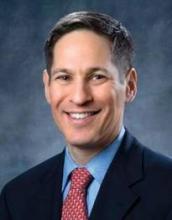The enemy is a virus, and the fight will be long and hard, but the tried and true public health measures will stop the spread of Ebola, said Dr. Thomas Frieden, director of the Centers for Disease Control and Prevention.
“The main point is to suspect Ebola and isolate it,” said Dr. Frieden during an Oct. 7 news briefing. You don’t need a fancy unit for infection control, he said. All you need is a private room with its own bathroom, and meticulous attention to details and protocols.
Federal officials are also planning to announce increased safety measures for travelers in the upcoming days.
In the past 2 months, CDC teams have screened more than 36,000 airplane passengers coming from West Africa, officials said. More than 70 have been stopped from boarding the planes, although there are no signs that any of them developed Ebola.
Meanwhile, Thomas Eric Duncan, the first person to be diagnosed with Ebola in the United States, remains in critical but stable condition. “He is on a ventilator and receiving kidney dialysis. His liver function, which declined over the weekend, has improved, but doctors caution that this could vary in coming days,” according to a statement from Texas Health Presbyterian Hospital, Dallas, where he is in isolation. He is still receiving the investigational drug brincidofovir.
Another American, a freelance journalist who tested positive for Ebola in Liberia and is now in isolation in Omaha, Nebraska, also is receiving the investigational drug.
Dr. Frieden said that no more ZMapp is available.
Federal and Texas health officials continue to monitor 48 individuals, 10 of whom have had definite contact with Mr. Duncan. None have shown any signs or symptoms of Ebola so far.
In Spain, a nurse who was caring for Ebola patients there became the first patient to contract Ebola outside of the affected West African countries. U.S. health officials said Oct. 7 that the case highlights the importance of meticulous attention to detail, teamwork, and careful attention to protocols.
Dr. Frieden said that there are some signs of progress in West Africa. The number of cases in some parts of Liberia has dropped, partly because there are enough isolation beds and because of improvements in burial practice safety, but there’s no way to know when the epidemic will be under control and come to an end.
So far, there’s no sign that the Ebola Zaire virus strain has mutated or become airborne, officials said.
Since Mr. Duncan was diagnosed with Ebola in Texas last week, federal health officials and President Barack Obama have stressed that isolating the affected West African countries is not the answer.
“One of our cardinal rules in medicine is do no harm,” said Dr. Frieden. Impeding the ability to control Ebola in West Africa will only increase the challenge of controlling the spread of the virus, he said.
On Twitter @naseemmiller



